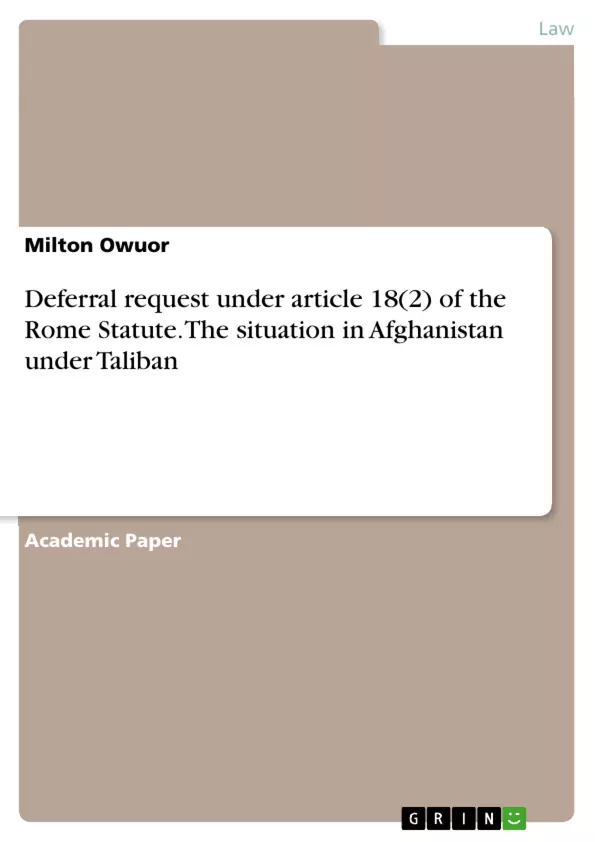This paper seeks to engage critically with the overarching legal issues basically revolving around the Afghanistan deferral request under article 18(2) of the Rome Statute , in the aftermath of the Taliban takeover of power in Afghanistan. In the two weeks preceding the completion of withdrawal of the US forces from Afghanistan, which was initially scheduled for 30 August 2021, the Taliban took over control of power in Afghanistan in an unprecedented rapid fashion. This takeover occasioned a hasty and abrupt exit, from power, of the erstwhile civilian administration, thereby engendering a complete collapse of the existing political regime. It also engendered considerable legal discourse and concern about the status of the outstanding Afghanistan deferral request, at the time pending at the International Criminal Court. This paper makes a participatory contribution to the legal discourse.
Inhaltsverzeichnis (Table of Contents)
- Prelude: Taliban takeover...
- Prosecutor's request for authorization of an investigation
- Article 18(2) deferral request
- Prosecutor's Notification of status to the Pre-Trial Chamber
- Article 18(2) in the new Taliban era
- The new Prosecutor Karim Khan and article 18(2) deferral request
Zielsetzung und Themenschwerpunkte (Objectives and Key Themes)
This paper examines the legal issues surrounding the Afghanistan deferral request under Article 18(2) of the Rome Statute, following the Taliban's takeover of power in Afghanistan. The paper analyzes the deferral request's legal basis, the role of the International Criminal Court (ICC) in the situation, and the implications of the Taliban's control for the ICC's investigation.
- The legal framework of the deferral request under Article 18(2) of the Rome Statute
- The principle of complementarity in international criminal law
- The ICC's role in investigating alleged war crimes and crimes against humanity in Afghanistan
- The implications of the Taliban's takeover for the ICC's investigation
- The potential for the ICC to assert jurisdiction over the situation in Afghanistan
Zusammenfassung der Kapitel (Chapter Summaries)
- Prelude: Taliban takeover...: This chapter introduces the legal issues surrounding the Afghanistan deferral request, situating it within the context of the Taliban's rapid takeover of power in Afghanistan.
- Prosecutor's request for authorization of an investigation: This chapter discusses the ICC Prosecutor's request for authorization to investigate the situation in Afghanistan, focusing on the legal arguments presented and the Pre-Trial Chamber's decision.
- Article 18(2) deferral request: This chapter delves into the Government of Afghanistan's request for deferral under Article 18(2) of the Rome Statute, examining the legal basis for the request and the principle of complementarity.
- Prosecutor's Notification of status to the Pre-Trial Chamber: This chapter outlines the ICC Prosecutor's notification to the Pre-Trial Chamber regarding the status of the deferral request and the ongoing situation in Afghanistan.
Schlüsselwörter (Keywords)
This paper focuses on the deferral request under Article 18(2) of the Rome Statute, the principle of complementarity, the ICC's jurisdiction, the situation in Afghanistan under the Taliban, and the implications for international criminal justice.
Frequently Asked Questions
What is an Article 18(2) deferral request?
Under the Rome Statute, a state can request the ICC Prosecutor to defer an investigation if the state is already investigating its own citizens or others within its jurisdiction for the same acts.
How did the Taliban takeover affect the ICC investigation in Afghanistan?
The collapse of the civilian administration created significant legal uncertainty regarding the status of the pending deferral request and the ability of the new regime to conduct genuine investigations.
What is the principle of complementarity?
It is a fundamental principle of the ICC where the court only acts as a court of last resort, stepping in only when national legal systems are unwilling or unable to genuinely carry out proceedings.
Who is the current ICC Prosecutor mentioned in the paper?
The paper discusses the role of Prosecutor Karim Khan in relation to the Afghanistan situation and the Article 18(2) request.
What crimes is the ICC investigating in Afghanistan?
The investigation focuses on alleged war crimes and crimes against humanity committed on the territory of Afghanistan.
Why was the withdrawal of US forces significant for this legal discourse?
The withdrawal in August 2021 led to the rapid Taliban takeover, which fundamentally changed the political and legal landscape that the original deferral request was based upon.
- Arbeit zitieren
- Prof. Dr. Milton Owuor (Autor:in), 2021, Deferral request under article 18(2) of the Rome Statute. The situation in Afghanistan under Taliban, München, GRIN Verlag, https://www.grin.com/document/1143193



